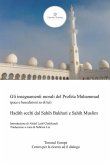This Book is evidenced based from authentic sources of the Quran and Sunah of the Prophet (SAW) and the work of some Muslim scholars. Accordingly, the primary sources used are: Tafsir Ibn Kathir and Kutub Sitta (six books of Sunah), namely: (i) Sahih Bukhari; (ii) Sahih Muslim; (iii) Sunan Abu Dawud; (iv) Jami At-Tirmidhi; (v) Sunan Nas'i and (vi) Sunan Ibn Majah. The Book is a reference manual for every household. This book consists of eighteen (18) Chapters. Chapter 1 consists of: Introduction. Chapter 2 consists of Morality: The Core of All Islamic Principles. Chapter 3 consists of: Humility and Submissiveness and includes: Introduction; Diseases of the Heart (Arrogance and Pride); Meanings of Humility; Merit and Rewards of Humility; Different Kinds of Humility; Humility in Prayers (Khasha'a); Humility in Du'a and Supplication; Allah [SWT] and His Messenger (SAW) Emphasized Humility; General Humility Lessons from the History; Some Methods to Cultivate Humility before Allah [SWT] in our Hearts; and Concluding Remarks. Chapter 4 consists of Seeking Tranquillity (Sakinah). Chapter 5 Consists of: Integrity. Chapter 6 Consists of: Courage (Shaja'at), Chapter 7 Consists of: Wisdom (Hikmah). Chapter 8 Consists of: Patience (Sabr). Chapter 9 Consists of: Modesty (Haya) and Includes: Introduction; Meaning of Modesty in Islam; and Importance of Modesty in Islam. Chapter 10 Consists of: Self-Control and Self-Restraint (Iffat) and includes: Introduction; Self-Control is the Way to Happiness; Methods of Self-Control and Self-Purification; Self-Restraint (Iffat) and Piety (Taqwa); the Significance of Self-Control and Self-Purification; Sources of Strength in Managing Physical Desires; How can a Muslim or Muslimah Discipline Oneself; and Concluding Remarks. Chapter 11 consists of: Control of Anger and Includes: Understanding Anger; Islamic Perspective on Anger; Quranic Reasoning Against Getting Angery; When Anger is Justified; Constructive Anger Vs. Destructive Anger; Management and Control of Anger; and Concluding Remarks. Chapter 12 consists of: Truthfulness and Honesty and includes: Introduction; Implication of Honesty; Building and Practices Honesty; and Internal and External Honesty.Chapter 13 consists of: Trustworthiness and includes: Introduction; Trustworthiness Was The Corner Stone of The Leadership of Prophet Muhammad (SAW); Scope of Trust in Islam which covers - General, Keeping Secrets of Others is a Trust, Performance of Duty is a Trust, Wealth and Ability Given by Allah [SWT] are a Trust, Appointment To High Offices and Posts is a Trust, Misuse of Office is Betrayal of Trust, and to Consider Trust as Personal Property is a Wicked Act-; Importance Of Trustworthiness In Islam; and Concluding Remarks. Chapter 14 consists of: Generosity and Kindness and includes: Introduction; Generosity Explained; Importance and the Value of Generosity in Islam; A Perspective on the Generosity of the Prophet (SAW); A Perspective on the Generosity of the Companions; Models of Generosity in Islam; Islamic Etiquettes of Generosity; Manifestations of Generosity; and Some Examples Of Generosity in Early Islamic History. Chapter 15 consists of: Promise Keeping and Faithfulness and includes: Introduction; Types of Promises; Man's Covenant with Allah [SWT]; Mutual Covenants and Agreements: Promise Keeping Between Man and Man; and Concluding Remarks. Chapter 16 consists of: Justice and Spirit of Forgiveness Against Avenge. Chapter 17 consists of: Other Islamic Virtues and includes: Introduction; Equilibrium And Moderation; Simplicity; Good Acts And Words (Al Hasanaat); Keeping Good Company; Sacrifice; Brotherhood; Sincerity. Chapter 18 consists of: Summary and Conclusion. The Book is supported with Bibliography.
Hinweis: Dieser Artikel kann nur an eine deutsche Lieferadresse ausgeliefert werden.
Hinweis: Dieser Artikel kann nur an eine deutsche Lieferadresse ausgeliefert werden.








